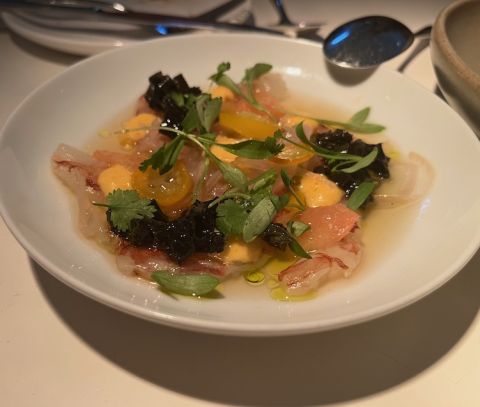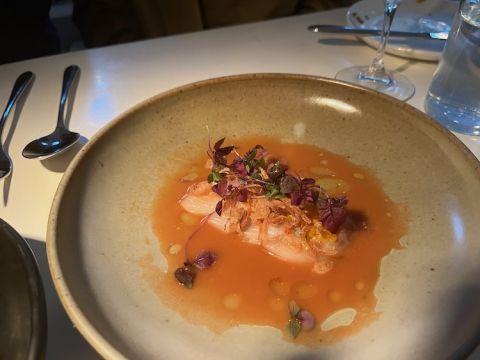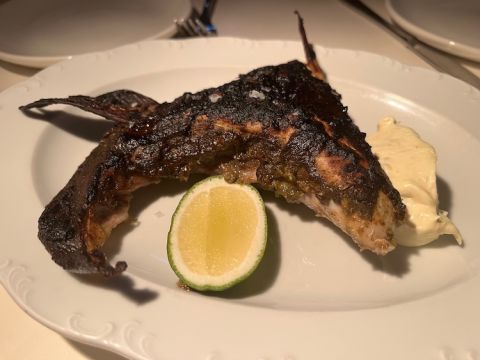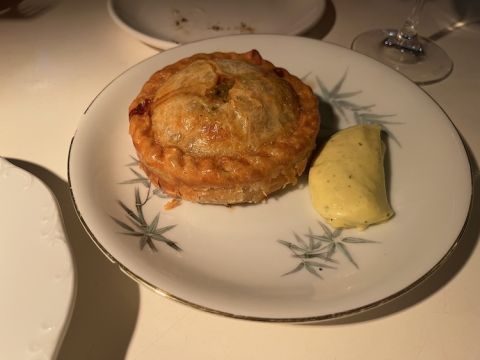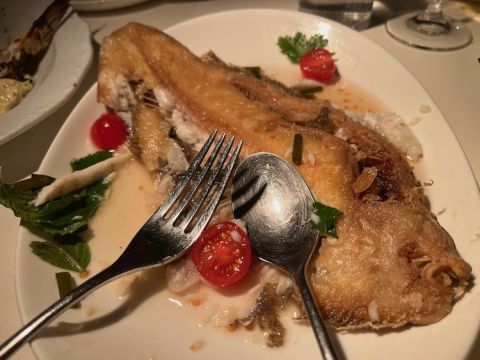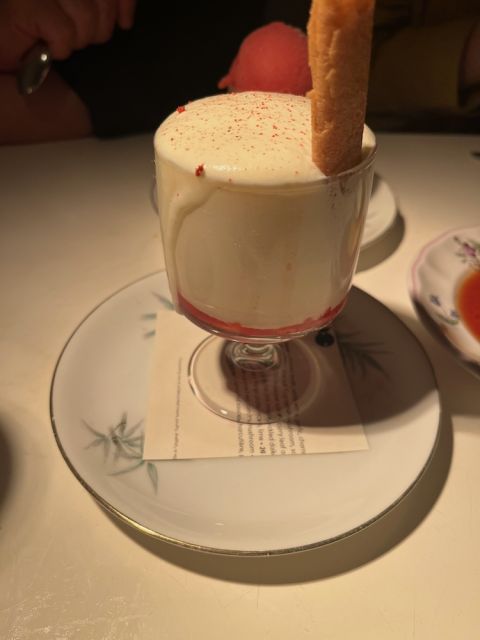A fishy gem in Brooklyn

Nick confesses to a piscatorial preference. Above, Eder Montero and Alex Raij of Saint Julivert Fisherie, pictured by John Midgley.
In general I prefer fish to meat for several reasons but one in particular: fish comes in a greater variety of shapes, colours and sizes than meat. No meat has quite as bright a colour as red mullet; nothing in the meat world is quite as athletic as a bluefin tuna; no meat has the same varied texture as squid.
And the same differences hold true with restaurants that specialise in either meat or fish. The menu at any steak restaurant is almost predictable, but those of fish restaurants can vary enormously. A big fish restaurant such as Scott’s in London’s Mayfair and Nobu Downtown in Manhattan can each take as much as $100,000 a day on occasion, from very different styles of predominantly fish menus.
What form the menu takes also depends far more on the restaurateur and chef’s talent in a fish restaurant than in one specialising in meat. There is also more variation in the style of fish restaurants – from the simplicity of Rafa’s on the Costa Brava to the elegance of Le Bernardin in New York – than there is among restaurants which specialise in meat.
Then there is Saint Julivert Fisherie in Brooklyn, which its owners, husband and wife Eder Montero and Alex Raij, run as well as La Vara, two doors away, and Txikito in Manhattan. Here we ate and drank extremely well from a wide-ranging menu composed entirely of fish and vegetable dishes and drank from a sensitive wine list that had been shaped by the experiences of these two extremely thoughtful owners.
The menu exudes confidence: three clear headings – Snacks, Chilled and Hot – each with seven dishes. We began with some whipped mackerel, nicely spiced with piri piri, before moving on to a dish of wild shrimp with salted kumquat, pomelo and poblano pepper (above); shiso tacos topped with raw scallop; and a plate of raw amberjack with raw kampachi and shiso oil (below) that was perhaps the standout dish of the evening. In each case, the same attention had been given to the condiments as to the raw fish.
The same care and attention was evident in the main courses, which we were somewhat unnecessarily advised to share: a jerked hamachi collar with mango pickle, mayo and lime; a cod pot pie that was much smaller than I had expected but delicate and delicious with a curry-leaf aioli; and the special of the day, a Dover sole, topped with tomatoes, its flesh accentuated by a pungent vinaigrette.
The desserts were as impressive: an old-fashioned zabaglione laced with sherry; a flan dish that did not spare the liquid caramel; and a sour cherry ice cream, a flavour described by my American hosts as ‘very New York’ that was excellent.
I began and ended my meal with a glass of sherry, a Manzanilla from Lustau at the outset and a glass of 12-year-old Amontillado El Maestro to finish. In between we enjoyed a bottle of 2021 Alte Reben Silvaner from Saalwächter in the Rheinhessen for $85 which all led to a bill of $370 for the three of us excluding service. It was worth every cent.
During our meal, we were interrupted twice. The first time by a bespectacled smiling woman, obviously in a hurry on her way out of the restaurant. ‘Hi’, she said, ‘I’m Alex and I do hope you are enjoying your meal.’ She stopped long enough to write her email in my notebook before leaving the restaurant.
A few minutes later, the genial man who doubles as general manager both here and at La Vara next door stopped by, enquired about our meal and added, ‘I see you’ve met Alex. It’s virtually impossible to keep her out of any of our kitchens.’
Two days later came her long and obviously thoughtful response to my emailed questions, signed by her as founder, chef and owner (with her husband) of the Saint Julivert Fisherie restaurant. To my first question – could she have chosen a more awkward name? – came this somewhat convoluted reply.
‘For context I’m Argentine American and our other restaurants are Spanish (because my husband and I met in a Spanish restaurant and began to plan a tapas bar as a way to reset the standard for Spanish food in NYC with the idea of resetting and then going from general to particular as in a Basque restaurant).
‘I grew up in the Midwest eating Italian, speaking Spanish, going to a Jewish deli that served Swedish meatballs. I’m used to being an outsider and trying to connect people and ideas, to make sense of filtering my tastes and experience through identity and to take liberties that sometimes bring things back to where they started … If you are an immigrant or the child of one you know how food is compromised in motion to make it possibly “less authentic and often more delicious”.
‘I have only worked for myself (consulting and opening my own places) for 30 years. That too is a bit isolating. So I force myself into discomfort to always try to improve and seek. Travel is something I almost never get to do enough now so I travel in my mind through menu-writing and travel through books and music etc. As a young person I was pretty lucky to travel to South America and Mexico and then Europe.
‘Additionally, as a woman in kitchens that were fairly anti-intellectual, I felt awkward because my idea of fun was really studying the whys of the food and paying close attention to the language around it and thinking often how much better things could be.
‘But I must be good at awkward names. Apparently, I pick difficult names. For example Txikito, our Basque restaurant in Chelsea, was pretty awkward in 2008 for Adam Platt, the restaurant critic for New York magazine, who said it was impossible to say.
‘At the time no-one (Americans think they are everyone) drank Txakoli, and it felt hard to say but of course all it means is little in Euskera. And it’s easy to stay if you don’t make American English the centre of your world.
‘At that time, we wanted to disrupt the paella paradigm. We were intentionally seeking to build an expansive vernacular and vocabulary so we could have the sophisticated conversations we wanted to have about regional specificity in Spain (the subject of our previous restaurants) and Basque cuisine.
‘I liked the name Saint Julivert Fisherie because I guessed, correctly, that people identify a Frenchieness in this completely fake, non-French name. They always pronounce it in French. (I don’t for the record.) I wanted people to come in with the mindset of a Parisian wine bar.
‘The implication is French techniques and home cooking details, but also we are saying many things that sound French but aren’t actually French in origin. Plenty of excellent flavours and sauces with French names do not have French origins. Anyway, ironically, julivert means parsley in Catalan. I think it’s a beautiful word for a workaday ingredient that is essential to the Spanish cook.’
There is a very Parisian feel about this restaurant. It’s cramped. There’s an open kitchen with a long line of customers sitting at the bar. You can close your eyes and imagine that instead of Brooklyn brownstones opposite there are the facades of Parisian apartment buildings. But Raij is adamant that despite enjoying French cooking, it was Basque cooking that taught her ‘how to treat and respect fish and how to sauce it’.
She seems to be something of a control freak, listing her responsibilities thus: ‘Specifically, I write all the menus, design all the dishes, select and buy the plates, glassware and flatware. I come up with the dishes, sauces and desserts almost exclusively on my own but we have a huge repertoire so there is a lot of remixing. I am not much of a line cook anymore but I prep daily and in moments like this I do communicate the intention of the places and try to maintain consistency and logic within and across the restaurants so our style and point of view is clear. It is quite consuming. These are very personal places and the creativity and singularity of the food is demanding. I feel accountable to it and the staff and the guests.’
Brooklynites specifically, New Yorkers more generally, and anyone who loves fish restaurants around the world as much as I do, should feel fortunate that Raij and her husband are such conscientious restaurateurs. And, as is only too apparent, they obviously love their job.
Saint Julivert Fisherie 264 Clinton St, Brooklyn, NY; tel: +1 (347) 987-3710. Open for dinner seven nights a week.
Every Sunday, Nick writes about restaurants. To stay abreast of his reviews, sign up for our weekly newsletter.
Become a member to view this article and thousands more!
- 15,408 featured articles
- 275,001 wine reviews
- Maps from The World Atlas of Wine, 8th edition (RRP £50)
- The Oxford Companion to Wine, 5th edition (RRP £50)
- Members’ forum
- 15,408 featured articles
- 275,001 wine reviews
- Maps from The World Atlas of Wine, 8th edition (RRP £50)
- The Oxford Companion to Wine, 5th edition (RRP £50)
- Members’ forum
- 48-hour preview of all scheduled articles
- Commercial use of our wine reviews

